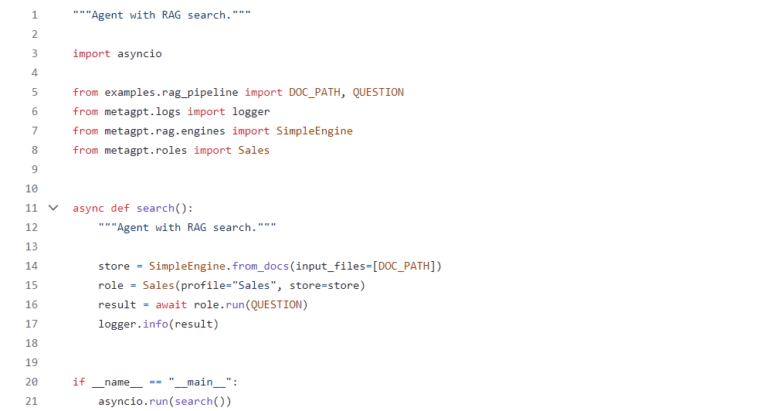- MetaGPT addresses complexities in software operations with a multi-agent approach.
- The RAG Module boosts GPTs’ response capacity using external knowledge bases.
- It enhances relevance, precision, and productivity in software development.
- MetaGPT streamlines processes, reduces manual intervention, and empowers teams.
Main AI News:
In today’s dynamic business landscape, software enterprises are tasked with efficiently managing intricate operations. Yet, conventional methodologies often fall short in offering holistic solutions to multifaceted demands, resulting in project management bottlenecks, developmental setbacks, and documentation inefficiencies.
Numerous remedies have been devised to tackle these hurdles. However, these approaches may lack the adaptability required to cater to the diverse requisites of varying projects. Some depend on specialized software suites or platforms, which could prove costly, cumbersome to deploy, and may not seamlessly integrate with existing infrastructures.
Enter MetaGPT: The Multi-Agent Framework. This groundbreaking solution revolutionizes how software enterprises navigate complex operations by leveraging the collective capabilities of multiple GPTs (Generative Pre-trained Transformers). MetaGPT assigns distinct roles to GPTs, forming a synergistic entity capable of executing myriad functions, including crafting user narratives, conducting competitive assessments, delineating requirements, structuring data frameworks, and documenting APIs.
Central to MetaGPT is the RAG Module, an acronym for Retrieve, Aggregate, and Generate. This module substantially enhances the response capacity of GPTs by tapping into external, authoritative knowledge repositories. It extends support for diverse data formats and Python objects, offers retrieval functionalities compatible with a plethora of methods such as Faiss, BM25, ChromaDB, and Elasticsearch, provides post-retrieval processing options for refining retrieved content, enables data updates, and ensures efficient data storage and retrieval mechanisms.
The efficacy of the MetaGPT RAG Module is evidenced by its heightened relevance and precision in output, augmented accuracy in sourcing and processing domain-specific knowledge, diminished dependence on manual intervention, and, most significantly, amplified productivity within software development teams. By harnessing domain-specific knowledge without necessitating retraining, MetaGPT empowers software enterprises to deliver superior outcomes in reduced timeframes and with optimized resource allocation, cultivating a more prolific and streamlined operational milieu.
Conclusion:
The emergence of MetaGPT and its RAG Module marks a significant turning point in the software industry. By addressing the limitations of traditional methods and leveraging the collective capabilities of multiple GPTs, MetaGPT offers a streamlined approach to complex software operations. The enhanced efficiency, productivity, and accuracy it brings to software development processes signify a notable shift in the market towards more advanced, AI-driven solutions. Companies that adopt MetaGPT stand to gain a competitive edge by delivering higher-quality outcomes in less time and with optimized resource allocation.

